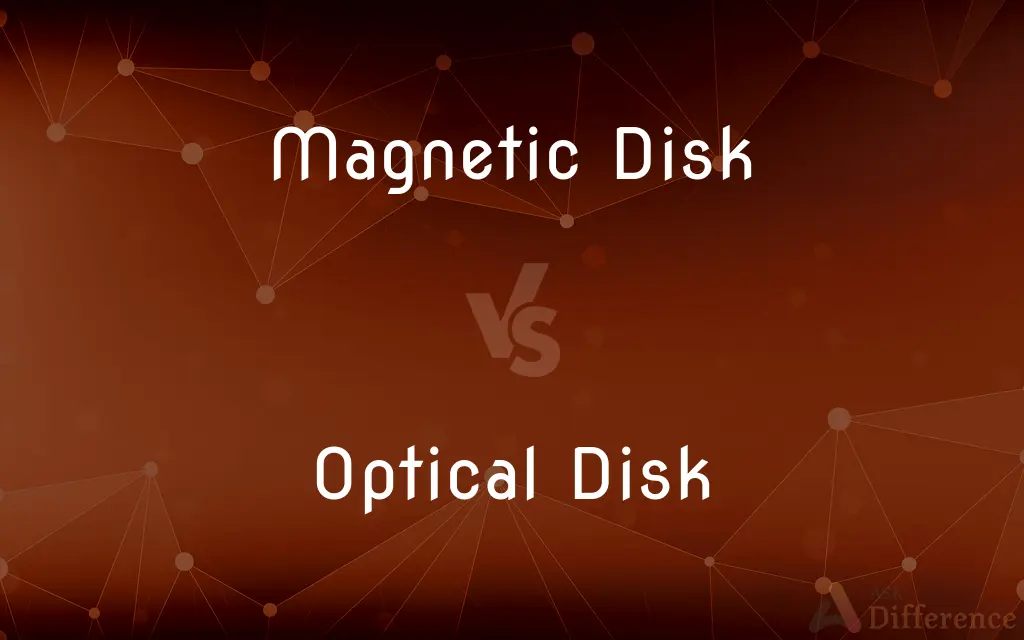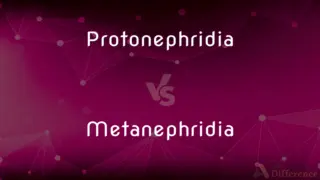Magnetic Disk vs. Optical Disk — What's the Difference?
By Tayyaba Rehman & Urooj Arif — Published on February 8, 2024
A Magnetic Disk uses magnetic patterns to store data, commonly found in hard drives. An Optical Disk uses laser technology to read and write data, examples being CDs and DVDs.

Difference Between Magnetic Disk and Optical Disk
Table of Contents
ADVERTISEMENT
Key Differences
Magnetic Disks, such as hard drives, store data by magnetizing small areas on a spinning disk. Optical Disks, like CDs and DVDs, use lasers to read and write data on their reflective surfaces.
In Magnetic Disks, data access speed is typically faster due to their direct read/write capabilities and mechanical nature. Optical Disks, however, have slower data access speeds, as they rely on optical technology for reading and writing data.
Magnetic Disks are generally more durable and suitable for frequent writing and rewriting of data. Optical Disks, while suitable for distribution, are more prone to damage and degradation over time.
The storage capacity of Magnetic Disks is usually higher, making them ideal for extensive data storage requirements. Optical Disks typically have lower storage capacities but are convenient for data distribution and portability.
Magnetic Disks are commonly used in computers and servers for primary data storage. Optical Disks are often used for media distribution, backups, and data archiving due to their portability.
ADVERTISEMENT
Comparison Chart
Data Storage Method
Magnetic patterns
Laser technology
Speed of Data Access
Faster due to direct read/write ability
Slower, reliant on optical technology
Durability
More durable, frequent rewrites
Prone to damage, less rewritable
Storage Capacity
Higher capacity
Lower capacity
Common Uses
Primary data storage in computers
Media distribution, backups
Compare with Definitions
Magnetic Disk
A Magnetic Disk is a data storage device using magnetic patterns to store and retrieve data.
The server's magnetic disk stores terabytes of company data.
Optical Disk
Optical Disks are suited for distribution and archiving, offering portability and ease of access.
She archived her photos onto an optical disk for safekeeping.
Magnetic Disk
Magnetic Disks are used in various computing devices for primary storage needs.
The laptop's magnetic disk was replaced due to a malfunction.
Optical Disk
Optical Disks have set storage capacities and are less durable than magnetic disks.
The optical disk was scratched, making it difficult to read the data.
Magnetic Disk
Magnetic Disks offer high-capacity, durable storage suitable for frequent data access.
The data center relies on magnetic disks for efficient data retrieval and storage.
Optical Disk
An Optical Disk is a storage medium using lasers to read and write data on a reflective surface.
He burned his presentation onto an optical disk for easy distribution.
Magnetic Disk
It refers to hard drives and similar devices using magnetized media for data storage.
He upgraded his computer with a larger magnetic disk for more storage space.
Optical Disk
It includes CDs, DVDs, and Blu-ray discs, commonly used for media and data storage.
The movie was available on an optical disk in both DVD and Blu-ray formats.
Magnetic Disk
A Magnetic Disk stores data on rotating platters coated with magnetic material.
The magnetic disk spins rapidly as it reads and writes information.
Optical Disk
An Optical Disk uses a laser beam to access data stored in a spiral track.
The optical disk player reads the music tracks using a laser.
Common Curiosities
What is an Optical Disk?
A storage medium using laser technology to read and write data on a reflective surface.
How do Magnetic Disks store data?
They store data by magnetizing small areas on a spinning disk.
Are Magnetic Disks faster than Optical Disks?
Yes, they typically have faster data access speeds.
What is a Magnetic Disk?
A storage device using magnetic patterns on spinning disks for data storage.
Are Magnetic Disks used in everyday computing?
Yes, they are commonly used in computers and servers.
What are common uses of Optical Disks?
They are often used for media distribution, backups, and archiving.
Can you rewrite data frequently on Optical Disks?
They are less suitable for frequent rewriting compared to Magnetic Disks.
Is a Magnetic Disk the same as a hard drive?
Yes, hard drives are a type of Magnetic Disk.
How do Optical Disks work?
They use lasers to read and write data on their surfaces.
Are Magnetic Disks more durable than Optical Disks?
Yes, they are more durable and suitable for frequent rewriting.
Can Optical Disks be damaged easily?
They are more prone to physical damage and degradation over time.
What types of Optical Disks are there?
Common types include CDs, DVDs, and Blu-ray discs.
Can Optical Disks hold as much data as Magnetic Disks?
Generally, no. Magnetic Disks usually have higher storage capacities.
Do Magnetic Disks use lasers to read data?
No, they use magnetic heads to read and write data.
Is it easy to carry Optical Disks for data transfer?
Yes, their portability makes them convenient for data transfer and distribution.
Share Your Discovery

Previous Comparison
Protonephridia vs. Metanephridia
Next Comparison
Kwanza vs. HannukahAuthor Spotlight
Written by
Tayyaba RehmanTayyaba Rehman is a distinguished writer, currently serving as a primary contributor to askdifference.com. As a researcher in semantics and etymology, Tayyaba's passion for the complexity of languages and their distinctions has found a perfect home on the platform. Tayyaba delves into the intricacies of language, distinguishing between commonly confused words and phrases, thereby providing clarity for readers worldwide.
Co-written by
Urooj ArifUrooj is a skilled content writer at Ask Difference, known for her exceptional ability to simplify complex topics into engaging and informative content. With a passion for research and a flair for clear, concise writing, she consistently delivers articles that resonate with our diverse audience.
















































